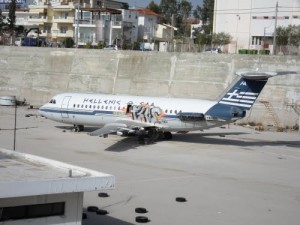 Greece’s struggle to reduce its public sector spending has been a political hot point for several years. The struggling nation, which is one of several Southern European countries to experience sluggish public sector activity, is in the middle of long-term cuts to public sector spending in order to balance its budget.
Greece’s struggle to reduce its public sector spending has been a political hot point for several years. The struggling nation, which is one of several Southern European countries to experience sluggish public sector activity, is in the middle of long-term cuts to public sector spending in order to balance its budget.
The reduction in public spending is exemplified in Athens’ ‘ghost airport’ – the city’s former hub airport that’s been sitting dormant for a decade. Ellinikon International Airport, as it’s known, was closed down shortly before the city hosted the Olympics in 2001 and has sat largely untouched since its last days of operation.
Despite closing over a decade ago, the airport has made little progress in terms of development and repurposing. Unused planes, many of which are still serviceable, sit unused on the runways. The terminal buildings sit unused, with one terminal a new museum dedicated to the country’s aviation history.
A recent BBC piece on the airport took a look at its lack of progress, seeing it as an indicator of Greece’s sluggish pace of redevelopment. The airport’s land is worth a large amount of money and its central location in Athens makes it a valuable part of the city for businesses and public enterprise.
Despite this, Ellinikon’s 12-year closed period has produced little in terms of long-term plans for what to do with the airport. As Greece needs to raise money for its bailout payments – most of which will need to come from public spending cuts – a sale of the airport terminal and its land seems fairly likely.
The property, according to the BBC, is three times as large as Monte Carlo, making it one of Athens’ most valuable pieces of central real estate. With the pressure high for the Greek government to raise funds, this currently dormant piece of real estate may be Athens’ cash cow for making quick repayments on its EU bailout.




